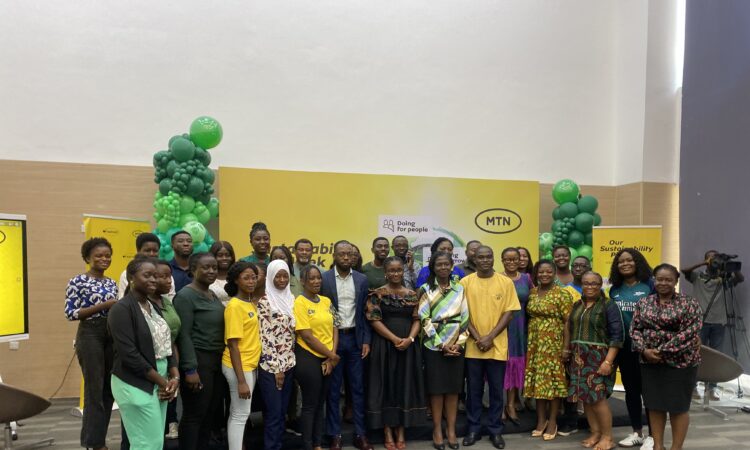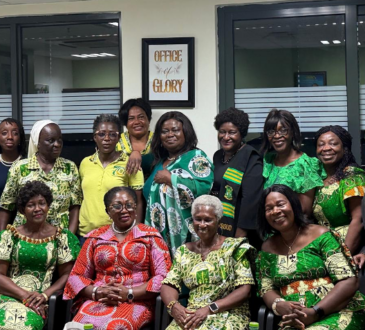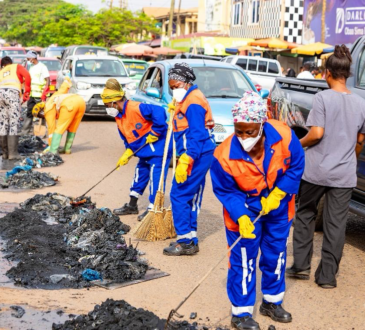
Telecommunications giant MTN Ghana, as part of its commitment to climate change and sustainability, has held a panel discussion in Accra to drive forward conversations on sustainable practices in the corporate sector.
The panel discussion, part of MTN Ghana’s sustainability week, centered on the theme “Sustainability: Our Collective Responsibility” and highlighted the roles that businesses, communities, and individuals play in promoting sustainable development in Ghana.
Dr. Felix Addo Yobo, Deputy Director of the Sustainable Development Goals (SDGs) Advisory Unit at the Office of the President, emphasized the shift toward sustainable solutions for addressing environmental issues.
“If you don’t embrace sustainability, you risk being left behind. Businesses across industries are embracing it, and for good reason—it’s more than just good PR. It gives you a competitive advantage, increases customer loyalty, and even opens new avenues for profit,” he said.
Dr. Addo-Yobo stressed the importance of avoiding “greenwashing”—making false or exaggerated claims about environmental efforts—to maintain sustainable business practices.
“To avoid this, businesses need to go beyond compliance and make sustainability part of their core operations, as a passion and vision. When it becomes part of the company’s DNA, greenwashing isn’t a concern because sustainability goals are integrated into their mission and values,” he explained.
He also highlighted that sustainable practices enhance a company’s ability to attract funding. “Many investors now demand companies demonstrate a commitment to ESG. When businesses can show this, it gives them an advantage, not just in reputation but in actual financing,” he noted.
He explained that the impact of ESG (Environmental, Social, and Governance) practices goes beyond external gains, whilst adding that “Companies should also consider their internal practices. Fair pay, flexible working arrangements, and non-discriminatory policies all contribute to a positive workplace that boosts productivity. Employees are happier, which benefits the business long-term.”
Bernard Owusu-Ansah, a Manager with KPMG Ghana’s Governance, Risk, and Compliance Services (GRCS) unit, also spoke on the importance of sustainability for businesses and its societal impact.
He noted that companies can achieve sustainability by integrating strong leadership and setting clear goals within their strategic plans.
“No business thrives without the right strategy and leadership commitment. For MTN, sustainability might seem remote, but the emissions from data centers, for instance, show that even telecom companies have roles to play in climate impact,” he said.
Mr. Owusu-Ansah urged businesses to evaluate their impact, saying, “It’s vital for companies to assess their resource efficiency and stewardship to ensure that future generations will have access to these resources.”
He warned against greenwashing, emphasizing that it could harm a company’s reputation if it misrepresented its sustainability efforts.
“Greenwashing can be a major setback, whether deliberate or accidental. Companies need to maintain data integrity and be transparent about what they are truly achieving,” he advised, recommending a structured reporting framework to help businesses avoid overstating their achievements and ensure that sustainability goals align with actual practices.
Mr Owusu-Ansah also pointed out that the Environmental Protection Agency (EPA) had signed a critical agreement to regulate environmental practices across industries.
“This agreement is crucial for future projects, as businesses will need to meet specific thresholds and undergo regular assessments. It’s part of our national efforts towards sustainable development,” he explained.
The Participant Engagement and Outreach Manager at the United Nations Global Compact, Mina Pokuaa Agyemang, described how ESG principles offer businesses a structured framework to measure their contributions to a sustainable global economy.
“The whole conversation around sustainability started at the United Nations, and ESG is a way for companies to assess how they’re impacting society. It’s not just about profit but about evaluating their contributions to humanity and the environment,” she stated.
Miss Agyemang noted that Ghana’s banking sector is particularly strong in its commitment to ESG, with financial institutions beginning to ask crucial questions before extending credit.
“Now, banks in our network ask not only about profitability but also about the impact of the loans they give. They want to know, ‘What will you use the money for, and will it be sustainable?’” she said.
The UN Global Compact, she explained, provides resources like the SDG (Sustainable Development Goals) Manager Tool, which helps small and medium-sized enterprises (SMEs) align their operations with specific sustainability goals.
“Any company—big or small—can use these tools. Just enter your industry details, and you’ll get suggestions on which SDGs to focus on and specific ways to integrate sustainable practices. Resources are available to those who are open-minded about embracing these principles,” Agyemang said.
The Chief Corporate Services and Sustainability Officer at MTN Ghana, Mrs Adwoa Afriyie Wiafe, emphasized MTN’s dedication to embedding sustainable practices across its operations.
“When it comes to our buildings, we have built in energy efficiencies. Through our MTN Foundation, we contribute significantly in areas of health, education, and economic empowerment. For example, yesterday we provided financial support to SMEs, including youth- and women-owned businesses and those operated by individuals with disabilities,” Wiafe said.
Mrs Wiafe also outlined MTN’s dedication to digital inclusion, particularly in equipping young people with digital skills to prepare them for future jobs saying that “We believe everyone deserves the benefits of a modern connected life, and we are working to ensure connectivity and expand our network,” she added.
By Jessel Lartey Therson-Cofie







